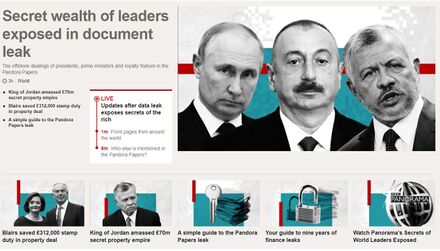Pandora Papers
 The homepage of BBC News on 3 October 2021. Curiously, despite Vladimir Putin not being mentioned once in the papers, the BBC still his picture there. | |
| Date | 2 October 2021 - 3 October 2021 |
|---|---|
| Interest of | Ali Bongo Ondimba, Sebastián Piñera |
| Description | The most expansive leak of tax haven files in history |
| Perpetrators | ICIJ |
Similar to Paradise Papers or Panama Papers.
Contents
Official narrative
Details of the Pandora Papers were released by the International Consortium of Investigative Journalists (ICIJ) on 3 October 2021.[1] Based upon the most expansive leak of tax haven files in history, the ICIJ investigation of the Pandora Papers reveals the secret deals and hidden assets of more than 330 politicians and high-level public officials in more than 90 countries and territories, including 35 country leaders, ambassadors, mayors and ministers, presidential advisers, generals and a central bank governor appear in the files.
The ICIJ, a nonprofit newsroom and network of journalists centered in Washington D.C., obtained more than 11.9 million financial records, containing 2.94 terabytes of confidential information from 14 offshore service providers, enterprises that set up and manage shell companies and trusts in tax havens around the globe.
The files reveal secret offshore holdings of more than 130 billionaires from 45 countries including 46 Russian oligarchs. In 2021, according to Forbes, 100 of the billionaires had a collective fortune of more than $600 billion. Other clients include bankers, big political donors, arms dealers, international criminals, pop stars, spy chiefs and sporting giants.
ICIJ shared the files with 150 media partners, launching the broadest collaboration in journalism history.[2]
Conspicuously missing
One way to steer the narrative is to pillory those who take advantage of the generous offer, but to leave out criticism of the states and associations of states that promote the supply of shell companies, such as the USA, Great Britain, and the European Union. Azerbaijani's president Ilham Aliyev is otherwise powerfully denounced as authoritarian and corrupt — but that Britain enabled him to buy 27 properties with the help of shell companies — no criticism.[3]
Missing are the financial havens that are central to corporations, banks and today’s leading investors: Right up front is the U.S. state of Delaware: and the states of Ireland, Luxembourg and the Netherlands. In addition, the Cayman Islands (British overseas territory), Singapore and the British Channel Islands of Jersey and Guernsey are the most important. The owners of the shell companies that are under the protection of the giant capital mangager BlackRock with 9 trillion in assets, and others such as Vanguard, State Street, Blackstone, KKR & Co, are also totally shielded.[3]
Missing but still became the main picture
The name “Vladimir Putin” never appears in the Pandora Papers even once. That doesn't stop corporate media from giving the impression that he is central in the leaks, giving his picture prime spot in its graphic presentations.
When the Guardian promoted the leaks in the article The Pandora papers reveal hidden riches of Putin’s inner circle,[4] it mentioned Putin's name 50 times. The alleged “inner circle” consists of just two people, and no evidence is provided to connect Putin to those persons’ financial dealings.
The nature of the alleged connection is that in 2003, a wealthy Russian woman named Svetlana Krivonogikh purchased a luxury flat in Monaco via a complex network of offshore companies. The Russian media outlet Proekt has alleged that in the late 1990s and early 2000s, Krivonogikh was Putin’s lover and gave birth to his daughter, allegations that have never been substantiated.[5]
The other Putin “link” revealed in the papers is that Krivonogikh’s apartment purchase was supposedly set up by a British accountancy and tax firm whose other clients include a long-standing friend of the Russian president – Gennady Timchenko.[5]
Who pays the piper
Nominally independent, the ICIJ is heavily financed by the usual Western government cutouts, including Open Society Foundations, USAID and the Ford Foundation, plus a host of similar foundations from minor NATO-countries, like the Adessium Foundation.
The US government funding could also explain why none of those exposed are Americans.
Leaders named
- Ilham Aliyev
- Mohamed Amersi
- Andrej Babiš
- Tony Blair
- Milo Đukanović
- Uhuru Kenyatta
- King Abdullah II of Jordan
- Ali Bongo Ondimba
- Sebastián Piñera
- Vladimir Putin
- Queen Elizabeth II
- Volodymyr Zelensky
Related Document
| Title | Type | Publication date | Author(s) | Description |
|---|---|---|---|---|
| Document:A bitter Middle East crisis at the heart of the Conservative Party | Article | 6 August 2021 | Peter Oborne | This crisis will not - thank goodness - claim lives as the Iraq War did. But it will damage Prime Minister Boris Johnson, who has already found himself involved in a series of sleaze investigations, of which this is the most personally dangerous for him. |
References
- ↑ "Pandora Papers: Secret wealth and dealings of world leaders exposed"
- ↑ "About the Pandora Papers"
- ↑ Jump up to: a b https://www.strategic-culture.org/news/2021/10/11/whos-missing-from-pandora-papers-main-offenders-and-accomplices/
- ↑ https://www.theguardian.com/news/2021/oct/03/pandora-papers-reveal-hidden-wealth-vladimir-putin-inner-circle
- ↑ Jump up to: a b https://www.rt.com/russia/536626-pandora-papers-us-russia-putin/